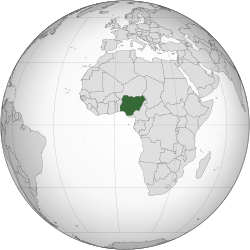First Nigerian Republic
This article needs additional citations for verification. (November 2014) |
Federal Republic of Nigeria | |||||||||
|---|---|---|---|---|---|---|---|---|---|
| 1963–1966 | |||||||||
| Motto: "Peace, Unity, Freedom"[1] | |||||||||
| Anthem: Nigeria, We Hail Thee[1] | |||||||||
 | |||||||||
| Capital | Lagos | ||||||||
| Common languages | English · Hausa · Igbo · Yoruba and other regional languages | ||||||||
| Religion | Islam · Christianity · Traditional beliefs | ||||||||
| Government | Federal parliamentary republic | ||||||||
| President | |||||||||
• 1963–1966 | Nnamdi Azikiwe | ||||||||
| Prime Minister | |||||||||
• 1963–1966 | Abubakar Tafawa Balewa | ||||||||
| Legislature | House of Representatives | ||||||||
| Historical era | Cold War | ||||||||
| 1 October 1963 | |||||||||
| 15 January 1966 | |||||||||
| Area | |||||||||
| 1963[3] | 923,768 km2 (356,669 sq mi) | ||||||||
| Population | |||||||||
• 1963[3] | 55,670,055 | ||||||||
| Currency | Nigerian pound | ||||||||
| Time zone | UTC+1 (WAT) | ||||||||
| Driving side | left | ||||||||
| ISO 3166 code | NG | ||||||||
| |||||||||
| Today part of | Bakassi peninsula ; governed by Nigeria until 2008 | ||||||||
 |
|---|
|
|
The First Republic was the republican government of Nigeria between 1963 and 1966 governed by the first republican constitution. The country's government was based on a federal form of the Westminster system. The period between 1 October 1960, when the country gained its independence and 15 January 1966, when the first military coup d’état took place, is also generally referred to as the First Republic. The first Republic of Nigeria was ruled by different leaders representing their regions as premiers in a federation during this period.
History
Foundation
The journey to independence began with some constitutional developments in Nigeria. These constitutional developments saw the country attaining self-rule in some quarters in 1957 and total independence on 1 October 1960.
Although
1966 coup
The political unrest during the mid-1960s culminated into Nigeria's first military
Civil war and beyond: 1966–79
The republic would be torn by the secession of
Government and politics
Executive
Dr.
Legislature
The Federal Parliament was the
Political parties
- Action Group (AG)
- Borno Youth Movement (BYM)
- Democratic Party of Nigeria and Cameroon(DPNC)
- Dynamic Party (DP)
- Igala Union (IU)
- Igbira Tribal Union (ITU)
- Midwest Democratic Front (MDF)
- National Council of Nigeria and the Cameroons/National Convention of Nigerian Citizens (NCNC)
- National Independence Party(NIP)
- Niger Delta Congress (NDC)
- Nigerian National Democratic Party (NNDP)
- Northern Elements Progressive Union (NEPU)
- Northern People's Congress (NPC)
- Northern Progressive Front (NPF)
- Republican Party (RP)
- United Middle Belt Congress (UMBC)
- United National Independence Party (UNIP)
- Zamfara Commoners Party (ZCP)
Regionalism
The original regional Premiers of the republic were the following:
- Northern Nigeria Ahmadu Bello (1959–1966)
- Western Nigeria Samuel Akintola(1960–1966)
- Eastern Nigeria: Michael Okpara (1960–1966)
- Mid-Western Nigeria: Dennis Osadebay (1964–1966)
The country was split into three geopolitical regions—
At Nigeria's independence, the Northern Region gained more seats in parliament than both Eastern and Western regions combined—this would cement Northern dominance in Nigerian politics for years to come. Resentment among southern politicians precipitated into political chaos in the country.
See also
- Nigerian Civil War
- Second Nigerian Republic (1979–1983)
- Third Nigerian Republic (1993)
- Fourth Nigerian Republic (1999–present)
References
- ^ ISBN 9781432788353.
- ^ "The Constitution of the Federal Republic of Nigeria (1963)" (PDF). p. 26.
- ^ a b Oshungade, I. O. (1995). "The Nigerian Population Statistics" (PDF). 1995 Directory of Nigerian Statisticians. 2: 58. Archived from the original (PDF) on 27 February 2013.
- ^ a b https://www.dawodu.com/const63.pdf The Constitution of the Federal Republic of Nigeria (1963)
- ^ John de St. Jorre, The Nigerian Civil War p. 36.
- ^ John de St. Jorre, The Nigerian Civil War, p. 35
- ^ John de St. Jorre, The Nigerian Civil War, p. 39.
- ^ John de St. Jorre, The Nigerian Civil War (Hodder and Stroughto Publishers: London, 1972, p. 30
- ^ John de St. Jorre, The Nigerian Civil War (Hodder and Stoughton Publishers: London, 1972) p. 30.
- ^ a b John de St. Jorre, The Nigerian Civil War, p. 30.


